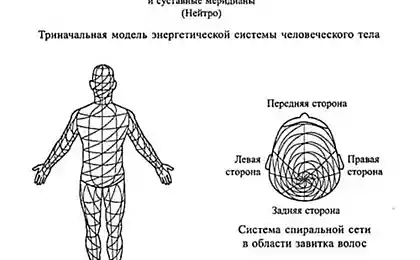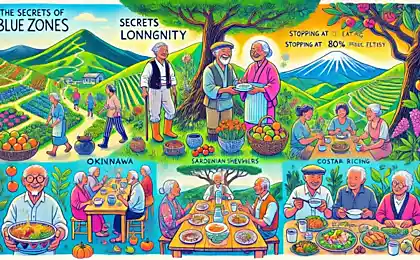467
Six unchanging RULES of life of centenarians
For a number of generations, the idea of longevity by summing the experiences of centenarians ancient times, developed the principles that allow a person to find inner harmony, "keep your mind calm and cheerful". These principles are known as the "Six unchanged."
Sixty million seven hundred eighty one thousand six hundred sixty one
© Weerapong Chaipuck
1st principle: Consistently be internally peaceful
How to achieve this? You need to maintain inner peace, without disturbing the mind vain. Not to be greedy, not to pander to the wanton desires. Leave the worries about personal gains and losses.
For this reason the follower of the ideas of a healthy lifestyle and longevity Shi Tanzi (Ming period) said: "If you restrain your desires, then the mind will come to peace. Look at distant mountains and secluded valleys! The majority of people living there, enjoy a long life thanks to the modesty of their desires and to the permanent peace of his mind".
Let's try to analyse their thoughts, to look at ourselves. Very often we unbearably want to have a fur coat (the same as... if not better), a car (same as... and even cooler), the house (this is the same... or even higher), etc. The worst thing is that these desires are not fleeting. We have long voiced their dreams, in the middle of the day and before bedtime. If we are really talking about our personal dreams and goals, then these tasks are worthy of respect. But if the thought is: "I want better than the neighbour" — that is the road to illness.
Such thoughts form a ball of negative emotions, which like a magnet attracts disease of our physical body. And ill, we start to lament: why anyone, nothing for me! What is even more aggravated by the process. If we analyze the thoughts of this kind, we can understand that this is a banal envy.
How does affect the body negative impact of envy depends on psychotype of the person. As you know, there are four: choleric, melancholic, sanguine and phlegmatic.
For the choleric it is fraught with spasm of blood vessels, tachycardia (heart's pounding too fast), "nervous" hypertension.
The melancholic can Resig-Ratsya problems with the digestive system: it is possible gallbladder and biliary colic, exacerbation of ulcers stomach and General abdominal discomfort.
Cheerful sanguine are less likely to be malicious envious. But if this happen, jealousy will systematically undermine their cardiovascular system and immune system.
Phlegmatic, because of natural "apathy", this black envy virtually no experience. They are characterized by rather annoyed with more successful people, saying, why do you excite me with its achievements and out of blissful hibernation? But neither to others nor to himself, envious of the phlegmatic is not dangerous.
Now let's look at ourselves. Do we need such problems? Isn't it better for everyone to learn to be happy with what he has. What do you need? Try to find small valuable rational, which brings us joy. Let's be optimistic?!
2nd principle: be Consistently good
Good people never try to harm others, they always find joy in the opportunity to help people. When a good man is something considering he always analyzes't hurt it…
That is opposed to goodness? Of course, anger, anger. And what is anger? This is an aggressive expression of resentment.
We live in a world of people, so, in the world of relationships. All our life is relationships. Whether we like it or not, but communication with others is very significant, and maybe the most important part of our lives. In relationships, we are constantly at work, home, child, husband, mother-in-law, passengers in the train, even if you don't communicate with them at the moment.
When this relationship is harmonious, which is not often, it means that we almost found the key to our successful life. For example, if a person has a good attitude at work, he enjoys her walks and usually in this case, successfully moving up the career ladder. If, moreover, he correctly built relations in the family, and home from work one returns with pleasure.
What prevents us to live happily? Where trouble starts? Where originates the offense?
But it all begins when our relationship with certain people does not coincide with reality. When the expected human behavior (what we came up with in my head: "this man needs to do so-and-so...") does not coincide with the real act of man. That was then, and the offense occurs.
In other words, we substitute a real relationship their own ideas about what they should be. When the communication partner does not fit into our ideas about him (and it almost never fits), the most common reaction to it becomes a dissatisfaction with them or the offense occurs. We were lied to. "I thought you were a normal person, and you...»
Resentment creates negative emotions and the tangle of these emotions change our physical body, leads to disease. Very often, the offense remains in the shower for a long time. It happens, people have a few years ago I changed jobs, and resentment against the head of the previous place of work constantly POPs up in his mind and fuels the change in the physical body.
The result of the "fresh" resentment usually becomes hypertension with access to the stroke, and "stuffy" — the tumor disease. Exactly on a tumor depends on who was spoiled relationship. For example, Louise hay, the author of popular books from the series "self-Help" says that if a woman in a bad relationship with her husband, it threatens her neoplastic diseases of reproductive organs, etc.
It is worth considering who we've done wrong his anger and resentment?
Of course, getting rid of resentments, changing your behavior is no easy task. This is serious work. However, if you realize that the keys to happiness and health we hold in our hands, we can do very much. And never too late to start.
And that's what Shi Tanzi advises us to perform the conditions of this disaster: "When others behave low, I retain integrity; when people create problems, I try to eliminate the problem; when people harm others, I support others. If I stands in this, then my conscience will be clean and the mind is naturally balanced and calm."
"We are free from all heavy thoughts, try to keep calm and optimistic, reverent, strong body and stable mind. So you can live to one hundred years", — stated in the fundamental work of the system of traditional Chinese medicine "Huangdi nacin ("Yellow Emperor's Canon of internal").
Indeed, where will the disease, if supported by the inner balance?
3rd principle: Consistently be resilient
In the East there is a proverb: "a Good laugh makes you feel younger by 10 years, and the alarm gives you gray hair". Depression and Christianity is one of the most serious sins.
How to overcome the tendency to discouragement? You should try to adapt to different circumstances, learn to be content with what we have. But it is important not to overdo anything. To protect the feelings of others, being careful to hurt them.
Most try to laugh heartily. We can assume that the noise of the people while laughing like a metronome tuned to the healthy state of his body. And when we laugh, it thus would be asking the program to work correctly, our bodies. That is, laughter can be compared with the work of the Adjuster of a Grand piano. He focused on the sound of the metronome. As our body focuses on laughter.
That's what the poet said Bo Tsuji in one of his poems:
Throw out the gloom and in wealth
and in poverty,
And if you can't laugh at that and another,
the fool will be remembered for!
4th principle: Consistently be satisfied
Very few people manage to avoid troubles. But whatever the trouble, we should never lose courage. Wu Yan Fata is the epigram about how to preserve life: "Look, someone thinks he has one, but at the same time, it lacks the other, and sometimes it seems to him that his lack of this and that. But should you step back and look in side you will find that you can easily live on that bowl of cereal that you have, and in the clothes that you are wearing". The first part of the utterance describes the emotional suffering from dissatisfaction, and the second shows the joy of satisfaction.
Therefore, if there are troubles, compare them to the more grievous situation and immediately you will feel calm and cheerful.
Van Sunyani — another connoisseur of the art of longevity, who lived during the Ming dynasty, was offered to "find pleasure in the world", while remaining cheerful and optimistic. The ability to recognize and enjoy helps to keep the satisfaction. Simple joys in life a lot, for example:
a pleasure to sit in silence. If after work to sit in silence, it will help to leave anxiety, a sense of deliberateness, of careless joy and become weak-tion. This is the case with a jar of muddy water: if you shake all day, and suspended in the water will be restless all day, and if you leave the jar alone, it settles and the water becomes transparent and clear.
fun to contemplate nature. Confucius said: "a Wise man pleasing water, the good delight of the mountains". Magnificent scenery and great views on a clear day it is possible to find in different places. The mind becomes as wide as the sky, if life is in harmony with Nature.5th principle: Consistently be fair
This constant represents a continuation of the 2nd principle: be consistently good ("Miz" No. 24). It should clearly draw the line between good and evil, right and wrong.
Let's assume that we are unfair to others. It would seem — well and what? This we are unfair, and resent the injustice is no longer us... But the world is arranged so that all comes back to us like a boomerang. Remember the truth — treat people the way you would like them to treat you?..
And here comes the moment when the "boomerangs" hail back to the owner. And how do we now feel? In our soul the tide rises, wrath of the righteous!
There is an aphorism: "Anger is often a cause of injustice". And Vice versa: "Injustice is the cause of the anger." But anger is a powerful emotion. And if you don't fight, don't let her go, she literally burns our body.
It is expressed in such diseases as skin rashes, inflammation, sores. Even, it would seem that such accidents as burns and cuts, too, categorized the responses of the organism to anger, nesting inside of us.
Good and evil are mutually exclusive concepts, nor can we confuse true and false. If the person retains consciousness clean, stands in his integrity, supports clarity of thought and clarity of sight, then he will naturally free from problems and anxieties.
Therefore the sage Shi Tanzi said:
"Only when pundit
endowed with pure consciousness,
disappear delusion
any artificiality
in acts.
When the sun falls from the sky,
the darkness dissipated itself.
When one understands this
that is a great idea,
it gets rid of the disease
and attains longevity."
Anger is destructive: it can easily destroy our world relations and as a consequence health. And to get rid of anger. How to do it?
If you're being treated unfairly, do not hold emotion in itself. The first thing to do is to say loudly: "It made me angry!"Maybe shouldn't say to your boss during a meeting, but after — Express your complaint out loud. Even if you say these words in an empty room, where no one will hear you — but let it happen. (Remember the methods of the Japanese room discharge with a figure, copy chief, where you can Express what you think of him!)
Visit the gym, play a game of volleyball or tennis. Or just work out at home with dumbbells. The body will thank you for the captured voltage. But if you loudly shout or sing, the rest after class you provided.
But, most importantly, be fair to the people around you. Remember: everything in this world returns — both good and evil, and injustice.
6th principle: Consistently be pleasant
Harmony is one of the main components of human relations. Be friendly, modest and considerate, tolerant and complacent, do not try to do only the calculation and don't worry over trifles. The friendliness in relations with other will make happy you and others.
The key word here is friendly. The opposite quality repulsion and antipathy. It is believed that these qualities on a subtle level has a very strong influence on the excretory system.
If you have kidney problems — for example, stones, — analyze, do you always friendly whether your surrounded by people who are unpleasant to you. And you, instead of try to change your attitude to that person, carry within themselves a bunch of dislikes. Worse you do only for themselves.
Life provides us with many options of existence. And everyone in our environment is like a teacher who gives us the opportunity of choice behavior. It's like our homework. And what grade we will get, to a certain extent, determines our health. Try to choose the right one?! published
Author: Irina Smirnova
P. S. And remember, just changing your mind — together we change the world! ©
Source: irismirnoff.blogspot.com/2010/11/5.html
Sixty million seven hundred eighty one thousand six hundred sixty one
© Weerapong Chaipuck
1st principle: Consistently be internally peaceful
How to achieve this? You need to maintain inner peace, without disturbing the mind vain. Not to be greedy, not to pander to the wanton desires. Leave the worries about personal gains and losses.
For this reason the follower of the ideas of a healthy lifestyle and longevity Shi Tanzi (Ming period) said: "If you restrain your desires, then the mind will come to peace. Look at distant mountains and secluded valleys! The majority of people living there, enjoy a long life thanks to the modesty of their desires and to the permanent peace of his mind".
Let's try to analyse their thoughts, to look at ourselves. Very often we unbearably want to have a fur coat (the same as... if not better), a car (same as... and even cooler), the house (this is the same... or even higher), etc. The worst thing is that these desires are not fleeting. We have long voiced their dreams, in the middle of the day and before bedtime. If we are really talking about our personal dreams and goals, then these tasks are worthy of respect. But if the thought is: "I want better than the neighbour" — that is the road to illness.
Such thoughts form a ball of negative emotions, which like a magnet attracts disease of our physical body. And ill, we start to lament: why anyone, nothing for me! What is even more aggravated by the process. If we analyze the thoughts of this kind, we can understand that this is a banal envy.
How does affect the body negative impact of envy depends on psychotype of the person. As you know, there are four: choleric, melancholic, sanguine and phlegmatic.
For the choleric it is fraught with spasm of blood vessels, tachycardia (heart's pounding too fast), "nervous" hypertension.
The melancholic can Resig-Ratsya problems with the digestive system: it is possible gallbladder and biliary colic, exacerbation of ulcers stomach and General abdominal discomfort.
Cheerful sanguine are less likely to be malicious envious. But if this happen, jealousy will systematically undermine their cardiovascular system and immune system.
Phlegmatic, because of natural "apathy", this black envy virtually no experience. They are characterized by rather annoyed with more successful people, saying, why do you excite me with its achievements and out of blissful hibernation? But neither to others nor to himself, envious of the phlegmatic is not dangerous.
Now let's look at ourselves. Do we need such problems? Isn't it better for everyone to learn to be happy with what he has. What do you need? Try to find small valuable rational, which brings us joy. Let's be optimistic?!
2nd principle: be Consistently good
Good people never try to harm others, they always find joy in the opportunity to help people. When a good man is something considering he always analyzes't hurt it…
That is opposed to goodness? Of course, anger, anger. And what is anger? This is an aggressive expression of resentment.
We live in a world of people, so, in the world of relationships. All our life is relationships. Whether we like it or not, but communication with others is very significant, and maybe the most important part of our lives. In relationships, we are constantly at work, home, child, husband, mother-in-law, passengers in the train, even if you don't communicate with them at the moment.
When this relationship is harmonious, which is not often, it means that we almost found the key to our successful life. For example, if a person has a good attitude at work, he enjoys her walks and usually in this case, successfully moving up the career ladder. If, moreover, he correctly built relations in the family, and home from work one returns with pleasure.
What prevents us to live happily? Where trouble starts? Where originates the offense?
But it all begins when our relationship with certain people does not coincide with reality. When the expected human behavior (what we came up with in my head: "this man needs to do so-and-so...") does not coincide with the real act of man. That was then, and the offense occurs.
In other words, we substitute a real relationship their own ideas about what they should be. When the communication partner does not fit into our ideas about him (and it almost never fits), the most common reaction to it becomes a dissatisfaction with them or the offense occurs. We were lied to. "I thought you were a normal person, and you...»
Resentment creates negative emotions and the tangle of these emotions change our physical body, leads to disease. Very often, the offense remains in the shower for a long time. It happens, people have a few years ago I changed jobs, and resentment against the head of the previous place of work constantly POPs up in his mind and fuels the change in the physical body.
The result of the "fresh" resentment usually becomes hypertension with access to the stroke, and "stuffy" — the tumor disease. Exactly on a tumor depends on who was spoiled relationship. For example, Louise hay, the author of popular books from the series "self-Help" says that if a woman in a bad relationship with her husband, it threatens her neoplastic diseases of reproductive organs, etc.
It is worth considering who we've done wrong his anger and resentment?
Of course, getting rid of resentments, changing your behavior is no easy task. This is serious work. However, if you realize that the keys to happiness and health we hold in our hands, we can do very much. And never too late to start.
And that's what Shi Tanzi advises us to perform the conditions of this disaster: "When others behave low, I retain integrity; when people create problems, I try to eliminate the problem; when people harm others, I support others. If I stands in this, then my conscience will be clean and the mind is naturally balanced and calm."
"We are free from all heavy thoughts, try to keep calm and optimistic, reverent, strong body and stable mind. So you can live to one hundred years", — stated in the fundamental work of the system of traditional Chinese medicine "Huangdi nacin ("Yellow Emperor's Canon of internal").
Indeed, where will the disease, if supported by the inner balance?
3rd principle: Consistently be resilient
In the East there is a proverb: "a Good laugh makes you feel younger by 10 years, and the alarm gives you gray hair". Depression and Christianity is one of the most serious sins.
How to overcome the tendency to discouragement? You should try to adapt to different circumstances, learn to be content with what we have. But it is important not to overdo anything. To protect the feelings of others, being careful to hurt them.
Most try to laugh heartily. We can assume that the noise of the people while laughing like a metronome tuned to the healthy state of his body. And when we laugh, it thus would be asking the program to work correctly, our bodies. That is, laughter can be compared with the work of the Adjuster of a Grand piano. He focused on the sound of the metronome. As our body focuses on laughter.
That's what the poet said Bo Tsuji in one of his poems:
Throw out the gloom and in wealth
and in poverty,
And if you can't laugh at that and another,
the fool will be remembered for!
4th principle: Consistently be satisfied
Very few people manage to avoid troubles. But whatever the trouble, we should never lose courage. Wu Yan Fata is the epigram about how to preserve life: "Look, someone thinks he has one, but at the same time, it lacks the other, and sometimes it seems to him that his lack of this and that. But should you step back and look in side you will find that you can easily live on that bowl of cereal that you have, and in the clothes that you are wearing". The first part of the utterance describes the emotional suffering from dissatisfaction, and the second shows the joy of satisfaction.
Therefore, if there are troubles, compare them to the more grievous situation and immediately you will feel calm and cheerful.
Van Sunyani — another connoisseur of the art of longevity, who lived during the Ming dynasty, was offered to "find pleasure in the world", while remaining cheerful and optimistic. The ability to recognize and enjoy helps to keep the satisfaction. Simple joys in life a lot, for example:
a pleasure to sit in silence. If after work to sit in silence, it will help to leave anxiety, a sense of deliberateness, of careless joy and become weak-tion. This is the case with a jar of muddy water: if you shake all day, and suspended in the water will be restless all day, and if you leave the jar alone, it settles and the water becomes transparent and clear.
fun to contemplate nature. Confucius said: "a Wise man pleasing water, the good delight of the mountains". Magnificent scenery and great views on a clear day it is possible to find in different places. The mind becomes as wide as the sky, if life is in harmony with Nature.5th principle: Consistently be fair
This constant represents a continuation of the 2nd principle: be consistently good ("Miz" No. 24). It should clearly draw the line between good and evil, right and wrong.
Let's assume that we are unfair to others. It would seem — well and what? This we are unfair, and resent the injustice is no longer us... But the world is arranged so that all comes back to us like a boomerang. Remember the truth — treat people the way you would like them to treat you?..
And here comes the moment when the "boomerangs" hail back to the owner. And how do we now feel? In our soul the tide rises, wrath of the righteous!
There is an aphorism: "Anger is often a cause of injustice". And Vice versa: "Injustice is the cause of the anger." But anger is a powerful emotion. And if you don't fight, don't let her go, she literally burns our body.
It is expressed in such diseases as skin rashes, inflammation, sores. Even, it would seem that such accidents as burns and cuts, too, categorized the responses of the organism to anger, nesting inside of us.
Good and evil are mutually exclusive concepts, nor can we confuse true and false. If the person retains consciousness clean, stands in his integrity, supports clarity of thought and clarity of sight, then he will naturally free from problems and anxieties.
Therefore the sage Shi Tanzi said:
"Only when pundit
endowed with pure consciousness,
disappear delusion
any artificiality
in acts.
When the sun falls from the sky,
the darkness dissipated itself.
When one understands this
that is a great idea,
it gets rid of the disease
and attains longevity."
Anger is destructive: it can easily destroy our world relations and as a consequence health. And to get rid of anger. How to do it?
If you're being treated unfairly, do not hold emotion in itself. The first thing to do is to say loudly: "It made me angry!"Maybe shouldn't say to your boss during a meeting, but after — Express your complaint out loud. Even if you say these words in an empty room, where no one will hear you — but let it happen. (Remember the methods of the Japanese room discharge with a figure, copy chief, where you can Express what you think of him!)
Visit the gym, play a game of volleyball or tennis. Or just work out at home with dumbbells. The body will thank you for the captured voltage. But if you loudly shout or sing, the rest after class you provided.
But, most importantly, be fair to the people around you. Remember: everything in this world returns — both good and evil, and injustice.
6th principle: Consistently be pleasant
Harmony is one of the main components of human relations. Be friendly, modest and considerate, tolerant and complacent, do not try to do only the calculation and don't worry over trifles. The friendliness in relations with other will make happy you and others.
The key word here is friendly. The opposite quality repulsion and antipathy. It is believed that these qualities on a subtle level has a very strong influence on the excretory system.
If you have kidney problems — for example, stones, — analyze, do you always friendly whether your surrounded by people who are unpleasant to you. And you, instead of try to change your attitude to that person, carry within themselves a bunch of dislikes. Worse you do only for themselves.
Life provides us with many options of existence. And everyone in our environment is like a teacher who gives us the opportunity of choice behavior. It's like our homework. And what grade we will get, to a certain extent, determines our health. Try to choose the right one?! published
Author: Irina Smirnova
P. S. And remember, just changing your mind — together we change the world! ©
Source: irismirnoff.blogspot.com/2010/11/5.html
Innovative material that is able to heal itself over time
A range of resources. Your energy for life























